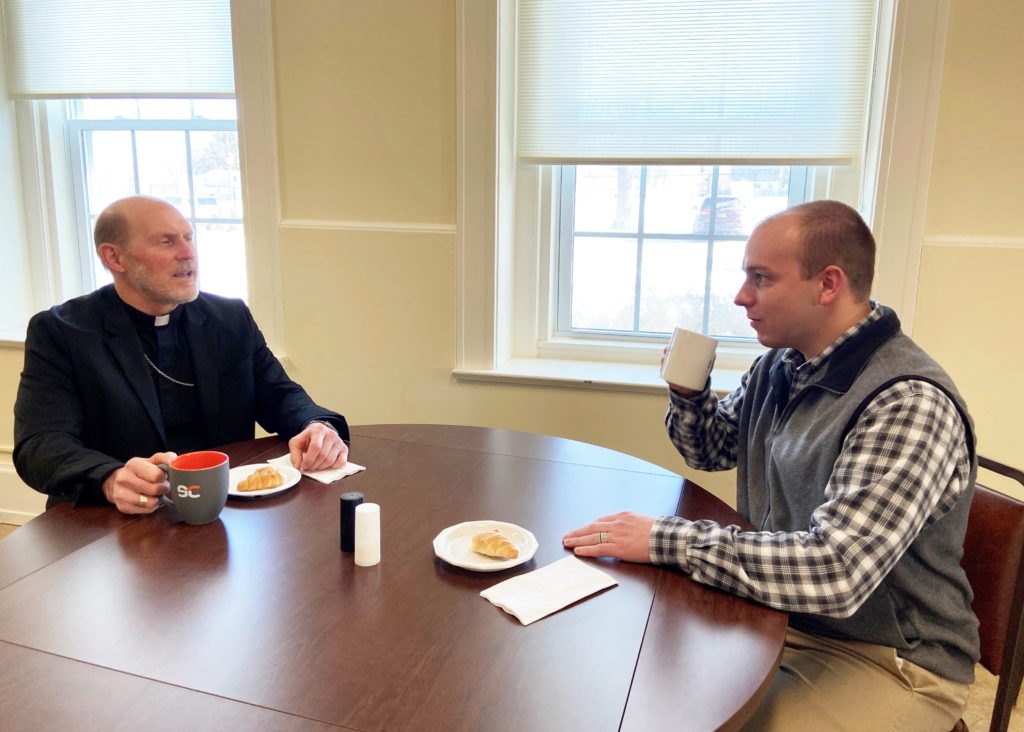Listening sessions during the monthslong opening phase of the synodal process are generating enthusiasm among participants as people hear from each other and reflect on how to build a more collaborative church, coordinators of the effort for the U.S. bishops said.
"These listening sessions have given life to the people of God in a way that I don't think has really happened in a long time," said Julia McStravog, a former U.S. Conference of Catholic Bishops employee who is a consultant to the bishops on the process.
Richard Coll, executive director of the bishops' Department of Justice, Peace and Human Development, who is coordinating the effort for the USCCB, agreed.
"From my perspective, it has been a great blessing and a source of continual surprise to see the level of engagement, the enthusiasm and the direction that these conversations and initiatives are taking," Coll told Catholic News Service.
The sessions have gained momentum since January as dioceses, organizations and religious orders have convened hundreds of large and small group sessions to allow people to express their desires for the Catholic Church in the world.
It's all part of Pope Francis' call to synodality, that is the members of the church listening to -- and hearing -- one another in all facets of church life. Under the theme "For a Synodal Church: Communion, Participation and Mission," the pope is seeking the involvement of laypeople collaborating with clergy in ministry, outreach and presence in society.
"The pope is calling for a spiritual formation of the people of God in a synodal way," McStravog explained. "That is going to take a long time. However, this is the start of the process, of these listening sessions and people feeling transformed by being heard and also by hearing other people's stories."
Individual dioceses have set the tone for how to respond to the pope's invitation since the local diocesan process opened in October, McStravog said. Some have held widescale listening sessions while others have used online surveys supplemented with smaller meetings.
The listening sessions are the first phase of a two-year discernment process in preparation for the Synod of Bishops in October 2023 at which the concept of synodality across the church will be discussed.
McStravog said dioceses have creatively addressed the pope's invitation to listen. She described the efforts as the work of the Holy Spirit flowing through the various types of diocesan structures.
The dioceses also are being guided by a Vatican published document known as a "vademecum," or handbook. It offers support for diocesan teams as they gather people to speak about their experience in their local church.
The USCCB developed a complementary preparatory document that offers background on the development of the process, which is rooted in the pope's often-made invitation for "journeying together" in the world.
McStravog said 176 of the nation's 196 dioceses and eparchies -- nearly 90% -- have appointed coordinators to work with the bishops' synodal process team.
Beyond the listening sessions -- and taking the pope's lead -- the USCCB team is encouraging outreach to hear the perspectives of marginalized people including those who have left the church, the poor and the homeless, the elderly, those in prison and the LGBTQ community.
The listening sessions and conversations will result in each participating diocese and eparchy submitting a 10-page synthesis report of what was learned. The USCCB is developing an online portal for the reports to be uploaded. It is expected to be ready in early May with a June 30 filing deadline.
McStravog described the upcoming reports as "sacred documents" that will reflect the faith journey of people as they have been inspired by the Holy Spirit.
In turn, those reports will be sent to regional gatherings, 16 in all. They include the U.S. Catholic Church's 15 regions incorporating dioceses and eparchies and one designated for organizations. Without offering specifics, McStravog said a large number of Catholic groups throughout the country have organized listening sessions.
From July 1 to 21 the regional representatives will work on drafting individual synthesis reports, submitting them to the USCCB. The regional offerings then will enter a "national synthesis phase" in which the USCCB team will draft a report.
Catholics nationwide will have time in early to mid-August to comment on the draft report. The USCCB team will finalize its report and submit it to the Vatican by the end of August.
The Vatican Secretariat of the Synod of Bishops will use the synthesized reports from bishops' conferences around the world to develop the "instrumentum laboris," or working document, to guide continental or regional ecclesial assemblies that will take place by March 2023.
Those assemblies will produce another set of documents that will help in the drafting of a second working document for the Synod of Bishops in October 2023. The synod is expected to produce a final document on synodality throughout the church.
Coll and McStravog said that they have heard from several dioceses that people are enthusiastic about continuing deeper collaboration, listening and engagement beyond the planned Synod of Bishops.
"This is really a lifelong process," Coll said. "It transcends the lives of any one of us and goes to the life of the church and how we are, (how we) live and breathe, and have our being as church in the future. It doesn't stop with any particular juncture. It's a way of being that hopefully deepens with the passage of time."

